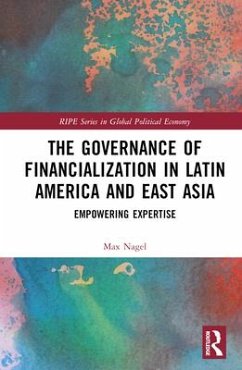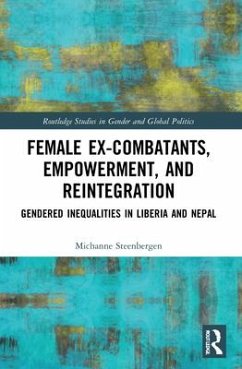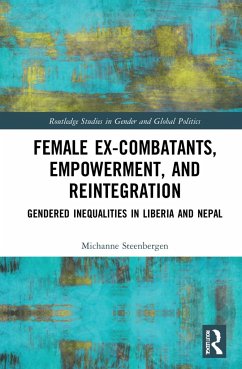
Feminist Policymaking in Turbulent Times
Critical Perspectives
Herausgegeben: Partis-Jennings, Hannah; Eroukhmanoff, Clara
Versandkostenfrei!
Versandfertig in 6-10 Tagen
154,99 €
inkl. MwSt.

PAYBACK Punkte
77 °P sammeln!
Feminist Policymaking in Turbulent Times offers a unique and timely reflection of the critical debates around the institutionalisation of feminist and gender-focused ideas and norms into policy.Many states and non-governmental organisations are increasingly invested in 'feminist policymaking' at the domestic and international levels. Yet, this liberal (feminist) agenda is also vastly disputed by critical, intersectional, and decolonial voices on the one hand, and by anti-gender movements around the world on the other hand. Indeed, while opposition to 'gender ideology' is mounting from reaction...
Feminist Policymaking in Turbulent Times offers a unique and timely reflection of the critical debates around the institutionalisation of feminist and gender-focused ideas and norms into policy.
Many states and non-governmental organisations are increasingly invested in 'feminist policymaking' at the domestic and international levels. Yet, this liberal (feminist) agenda is also vastly disputed by critical, intersectional, and decolonial voices on the one hand, and by anti-gender movements around the world on the other hand. Indeed, while opposition to 'gender ideology' is mounting from reactionary, religious, and secular forces, feminist policymaking is also being challenged in important ways from within. Thus, this book situates feminist policymaking in a challenging and 'turbulent' global context. This book explores feminist policymaking in multiple areas of policy, examining various gender-focused programmes that states and international organisations have undertaken in the last decade, offering critical interventions and rethinking the relationship between feminism and policy. This book not only reflects on the advances of feminist policymaking globally but also critically assesses the intersectional challenges embedded within it and lying ahead. It moves the field forward by creating opportunities, based on lived experiences, for re-imagining the transformative potential of the nexus between feminism and policymaking. Interdisciplinary in scope and bringing to the fore the voices of both academics and practitioners, this book is the product of an international collaboration, forging links and dialogue that are increasingly necessary to question some of the exclusionary, militaristic, and hierarchical assumptions of policymaking which is labelled as feminist.
Feminist Policymaking in Turbulent Times will be of interest to all scholars, students, and practitioners interested in the role of gender in policymaking and concerned with contestations around gender-focused projects.
Many states and non-governmental organisations are increasingly invested in 'feminist policymaking' at the domestic and international levels. Yet, this liberal (feminist) agenda is also vastly disputed by critical, intersectional, and decolonial voices on the one hand, and by anti-gender movements around the world on the other hand. Indeed, while opposition to 'gender ideology' is mounting from reactionary, religious, and secular forces, feminist policymaking is also being challenged in important ways from within. Thus, this book situates feminist policymaking in a challenging and 'turbulent' global context. This book explores feminist policymaking in multiple areas of policy, examining various gender-focused programmes that states and international organisations have undertaken in the last decade, offering critical interventions and rethinking the relationship between feminism and policy. This book not only reflects on the advances of feminist policymaking globally but also critically assesses the intersectional challenges embedded within it and lying ahead. It moves the field forward by creating opportunities, based on lived experiences, for re-imagining the transformative potential of the nexus between feminism and policymaking. Interdisciplinary in scope and bringing to the fore the voices of both academics and practitioners, this book is the product of an international collaboration, forging links and dialogue that are increasingly necessary to question some of the exclusionary, militaristic, and hierarchical assumptions of policymaking which is labelled as feminist.
Feminist Policymaking in Turbulent Times will be of interest to all scholars, students, and practitioners interested in the role of gender in policymaking and concerned with contestations around gender-focused projects.














